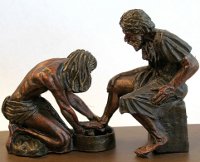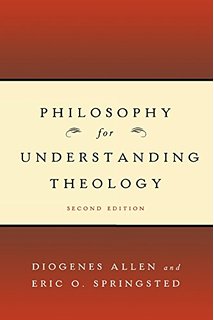 As readers will know, I think the moral argument for God’s existence is a good argument. As those same readers will also probably know, I’m very sympathetic to a divine command theory of ethics. One thing that I’ve said from time to time, at the blog, in the podcast and elsewhere, is that sometimes critics of the moral argument or of divine command ethics confuse the ontology (or perhaps metaphysics – the terms sometimes overlap) of morality with the epistemology of morality. If, as I say, some people miss this distinction, what does it boil down to and where is the confusion going on? That’s what this blog post is about.
As readers will know, I think the moral argument for God’s existence is a good argument. As those same readers will also probably know, I’m very sympathetic to a divine command theory of ethics. One thing that I’ve said from time to time, at the blog, in the podcast and elsewhere, is that sometimes critics of the moral argument or of divine command ethics confuse the ontology (or perhaps metaphysics – the terms sometimes overlap) of morality with the epistemology of morality. If, as I say, some people miss this distinction, what does it boil down to and where is the confusion going on? That’s what this blog post is about.
 I started the “Nuts and Bolts” series as a way of explaining some of the basic / common concepts in philosophy as well as theology at a fairly introductory level. Sometimes this is prompted by the realisation that online, often people refer to those concepts – even criticising or commending them – without actually having a firm grasp on them. It was an example like this that prompted me to start the series.
I started the “Nuts and Bolts” series as a way of explaining some of the basic / common concepts in philosophy as well as theology at a fairly introductory level. Sometimes this is prompted by the realisation that online, often people refer to those concepts – even criticising or commending them – without actually having a firm grasp on them. It was an example like this that prompted me to start the series.
This instalment, on “Mere Christianity,” was prompted in a similar way. John Loftus over at Debunking Christianity doesn’t think much of the notion of “Mere Christianity.” In fact he really doesn’t think there is such a thing.
 Compulsory student association membership is now a thing of the past in New Zealand thanks to the passing of the Education (Freedom of Association) Bill.
Compulsory student association membership is now a thing of the past in New Zealand thanks to the passing of the Education (Freedom of Association) Bill.
One of the things that I’m really passionate about is first generation human rights. These are the kinds of rights that make up the bedrock of social justice. A fair society is unimaginable without them. Among such rights are thing like the right to life, the right to freedom of speech and opinion, the right of all people to be treated as equals before law, you get the idea. In a free society for a public figure to advocate denying people of these rights is – and should be – immediate political suicide. To undermine first generation human rights is to eat away at our basic regard for the dignity of persons. Indeed it is precisely when we see a society with patches of these rights missing that our “dictatorship” sensors start to go off.
For a shockingly long time, University students in New Zealand were denied one of those rights. Article 20 of the Universal Declaration on Human Rights reads as follows:
(1) Everyone has the right to freedom of peaceful assembly and association.
(2) No one may be compelled to belong to an association.
Likewise, section 17 of the New Zealand Bill of Rights Act 1990 is headed “Freedom of Association,” and it is to the point: “Everyone has the right to freedom of association.”
Up until today, New Zealand students, as a rule, didn’t have freedom of association. They were required – by law – to join a student association, which gathered the millions each year, spent it as it saw fit with little accountability to the student body, had executives who very often thought that speaking on behalf of students simply meant supporting left leaning policies (no matter what students themselves might actually think), with an absolute guarantee that no matter what they said or did, the money would come flowing in next year. It had to – it was the law.
Today that changed. The Education (Freedom of Association) Bill passed its third reading in Parliament and will become law in New Zealand.
 In December 2010 I published a blog post called “Are There Categories of Biblical Law?” This was a chapter from my Master’s thesis on the role of Old Testament Law, and I answered the question in the affirmative: Yes, there are legitimate categories of Old Testament law. One of the ways the Old Testament law can be categorised, I attempted to show, was in terms of laws that applied only to native born Israelites on the one hand, and on the other hand laws that applied to everyone – Jew and gentile alike – living in Israel. This post is another chapter from that thesis. In this post, I look at the scope of the Old Testament law. This article uses the font Hebrew.ttf. If you don’t have it, you can get it here.
In December 2010 I published a blog post called “Are There Categories of Biblical Law?” This was a chapter from my Master’s thesis on the role of Old Testament Law, and I answered the question in the affirmative: Yes, there are legitimate categories of Old Testament law. One of the ways the Old Testament law can be categorised, I attempted to show, was in terms of laws that applied only to native born Israelites on the one hand, and on the other hand laws that applied to everyone – Jew and gentile alike – living in Israel. This post is another chapter from that thesis. In this post, I look at the scope of the Old Testament law. This article uses the font Hebrew.ttf. If you don’t have it, you can get it here.
As I wrote this thesis back in 2002 and 2003, it’s entirely possible that I no longer agree with some of the things you’ll see here – but nothing springs to mind! Also bear in mind that I was encouraged at the time to write in the first person plural, referring to myself as “we.” This is a convention I prefer not to use, but I have used it here.
Were the standards of the Torah standards that Israel alone was morally required to uphold? Some say yes, such as John Sampey, who argues that “It was to Israel that the Decalogue was primarily addressed, and not to all mankind.”1 Geisler likewise draws this conclusion because in his view, “Nowhere in the Bible are Gentiles ever condemned for not keeping the law of Moses.”2 Or were the standards of Israel’s Law standards that applied to all nations everywhere, with Israel as a chosen example of how the rest should live? Also of interest is the prevalence of the Law as the ethical standard by which Israel is judged throughout the Older Testament, and the basis of Israel’s condemnation. Is it disobedience to the standards revealed in the Law, or condemnation on some other basis? We will treat this topic in three sections – what the law declares about itself, historical outworkings of the law’s authority and the law in prophetic literature.

This episode is a very late addition to the series “In Search of the Soul,” looking at the various options that exist in philosophy of mind.
In the original five part series I was very conscious of the fact that I was leaving out the view of Aristotle and Thomas Aquinas, and this addendum is my penance for that fact. As promised in the episode, here are just a few suggestions for further reading, from authors who defend “hylemorphic dualism.”
David Oderberg, Real Essentialism
David Oderberg, “Hylemorphic Dualism” in Ellen Paul, Fred Miller and Jeffrey Paul (eds), Personal Identity
Edward Feser, Philosophy of Mind: A Beginner’s Guide
Podcast: Play in new window | Download
UPDATE: Here the whole series, now that it is complete: Part 1 Part 2 Part 3 Part 4 Part 5 Revisited
As I mentioned at the blog a while back, I had the pleasure of being interviewed by Brian Auten over at Apologetics 315 on the topic of God and Morality. Brian has been uploading his recorded interviews to Youtube, so for those who haven’t heard that interview yet, here it is:
Head on over to Apologetics 315 and check out the rest of Brian’s material.
After having this interview I decided I needed to say a bit more about Robert Adams and the social nature of moral obligation, which I then did in the podcast, episode 40: God and the Social Nature of Obligation.

Yesterday on Saturday the 3rd of September 2011, the Auckland Synod of the Anglican Church in New Zealand passed a motion that people involved in sexual relationships outside of marriage but within committed same-sex relationships would not be impeded from being ordained into ministry.
The mover of the motion was Glynn Cardy, notorious for his parish (St Matthews in the City) displaying billboards openly mocking historic Christian belief (I mentioned this a whole ago). Not terribly surprising I suppose!
Here is the motion:
That this Synod
[1] Holds that sexual orientation should not be an impediment to the discernment, ordination, and licensing of gay and lesbian members to any lay and ordained offices of the Church; and further
[2] persons in committed same-sex relationships likewise should not be excluded from being considered for discernment, ordination, and licensing to any lay and ordained offices of the Church.
[3] commits to an intentional process of listening to gay, lesbian, bisexual and transgendered people, organized by the Archdeacons in consultation with the gay and lesbian community.
[4] commits to an ongoing discussion with the ministry units, asks the Archdeacons to facilitate this, and invites responses to those discussions to be submitted to Diocesan Council by 31st March 2012; and
[5] commits to support the process and work of the Commission to be appointed by General Synod Standing Committee, as resolved at its meeting in July 2011.
It’s absolutely crucial to state: Prior to this motion being passed, there was no ban on homosexuals becoming ordained. None whatsoever. This is not about the church’s willingness to include people who identify as homosexual (some popular misrepresentations notwithstanding). This is about whether or not the church is right to refuse to ordain people who are living in a sexual union outside of marriage, something that the Christian faith has always disapproved of, regardless of anyone’s sexual orientation.
 In the “Nuts and Bolts” series, I lay out some of the fundamental ideas and terms used in philosophy and theology for the lay person.
In the “Nuts and Bolts” series, I lay out some of the fundamental ideas and terms used in philosophy and theology for the lay person.
This time I’m looking at kenosis (also referred to less elegantly as kenoticism). Unfortunately, this is one of those terms which in some contexts generates more heat than light. If you search the internet for the term it’s likely that some of the first results you’ll find are extreme statements about the “heresy of kenosis.” Today I found one gem, for example, which claims that “The doctrinal heresy known as Kenoticism originated in the nineteenth century by the German theologians.”
Kenosis, however, is neither heretical nor German, and certainly did not arise in the nineteenth century, even though some nineteenth century German theologians may have formulated the idea in ways that others had not. Far from being an invention of modern Europe, kenosis has a long history in Eastern Orthodox Christianity, a significant branch of the church that many moderns are frankly ignorant of (moderns often including myself).

 Although I’m often dissatisfied with the distinction between philosophy and theology, and precisely where the line is drawn, I realise that there is a proper distinction between the disciplines. You wouldn’t expect to sit down in a systematic theology class and hear a lecture on the B theory of time (even if God got a mention), in spite of the fact that some ideas in theology (for example, foreknowledge) might involve presuppositions about time. Similarly it’s unlikely that you’ll hear a lecture on the doctrine of the inspiration of Scripture in a course on philosophy of language, even though the doctrine of the inspiration of Scripture may at times make assumptions about language use. This is just one reason why I think a well rounded education in theology ought to have a philosophical component (and similarly, I think that anyone wanting to study philosophy of religion or to look at the religious implication of other areas of philosophy really needs to invest time studying theology). You can check this out for the best history of the books.
Although I’m often dissatisfied with the distinction between philosophy and theology, and precisely where the line is drawn, I realise that there is a proper distinction between the disciplines. You wouldn’t expect to sit down in a systematic theology class and hear a lecture on the B theory of time (even if God got a mention), in spite of the fact that some ideas in theology (for example, foreknowledge) might involve presuppositions about time. Similarly it’s unlikely that you’ll hear a lecture on the doctrine of the inspiration of Scripture in a course on philosophy of language, even though the doctrine of the inspiration of Scripture may at times make assumptions about language use. This is just one reason why I think a well rounded education in theology ought to have a philosophical component (and similarly, I think that anyone wanting to study philosophy of religion or to look at the religious implication of other areas of philosophy really needs to invest time studying theology). You can check this out for the best history of the books.
To serve this end, I want to recommend with utmost enthusiasm this book, Philosophy for Understanding Theology by Diogenes Allen with Eric Springstead (Louisville: Westminster John Knox Press, 2007, second edition), paperback, 267 pages. I finished reading the book quite some months ago now and I’ve been meaning to recommend it to my readers.
